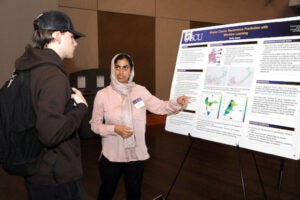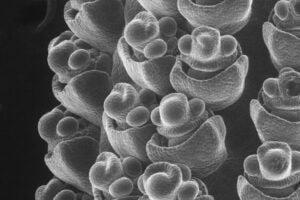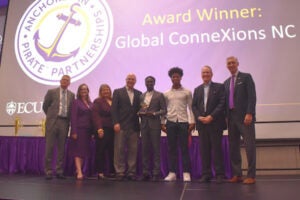Innovation and creativity take center stage during weeklong event
The Main Campus Student Center ballrooms buzzed with conversation as rows of strategically constructed posters lined the space. East Carolina University students presented research and creative projects they had spent months or even years developing, eager to share their new ideas, fresh perspectives and exciting breakthroughs.

Sofia Azam explains research on the use of machine learning to predict breast cancer recurrence to another student during Research and Creativity Achievement Week. (Photo by Ken Buday)
Research and Creative Achievement Week (RCAW) at ECU was March 30 to April 4, a week full of events that recognized and celebrated scholarly excellence. RCAW offers a dynamic platform for undergraduate and graduate students, postdoctoral scholars and faculty to present their research and creative work across a wide range of disciplines.
This year, more than 400 participants showcased their projects through posters, talks, performances and photos, with topics spanning biomedical sciences, business, education, engineering, the arts, humanities and more. The event not only showcased the breadth and depth of ECU’s research and creative endeavors but also reinforced the university’s commitment to innovation and collaboration, providing an opportunity for participants to share their work, gain feedback and engage with the broader academic community.
“RCAW is not only a demonstration to the public that ECU is a vibrant research and creative community, but also it is an educational experience that gives students and postdoctoral scholars the opportunity to practice career-necessary skills,” said Dr. Kathy Cox, associate dean of ECU’s Graduate School and co-organizer of RCAW. “We are hearing more and more that employers want career readiness in their employees, and we believe RCAW is just one example of how ECU is providing career readiness knowledge and skills to all our students.”
The week began with Undergraduate Student Presentation Day, showcasing podium and poster presentations across disciplines.
Artificial intelligence (AI) was a popular topic across a variety of fields, reflecting a collective effort to understand how AI can be harnessed to benefit society and how its capabilities can be further enhanced.
Sofia Azam, a junior majoring in computer science and mathematics, is conducting ongoing research using machine learning to predict breast cancer recurrence. She is part of a collaborative team including Marian Sousan, Majoie Ngandi and Precious Esong Sone. Dr. Nic Herndon, associate professor in the Department of Computer Science, is serving as the faculty advisor with support from Dr. Joseph Geradts of ECU Health.
Azam noted the value of using AI in a meaningful way.

Emma Lou Pakulniewicz’s winning microscope image shows a young ear of corn, where cells are developing into parts of the flower, like stamens and other structures. (Contributed photo)
“Seeing the ways that artificial intelligence can be applied for such a beneficial purpose has helped me understand the versatility of modern technology, and I can use this experience in the future in different fields. … Being able to see if there is an outcome that can benefit people in the long run, not just ECU Health but in other areas and other areas of health care, is really important.”
Graduate Student and Postdoctoral Scholars Day offered presentations of advanced research, and the afternoon’s International Scholar and Student Symposium highlighted the global perspectives and collaborative efforts that enrich the university’s academic and research environment.
This year brought a special addition with a campuswide celebration of ECU’s recent designation as a Research 1 (R1) institution, placing it among the nation’s top research universities. The event featured a panel discussion with Dr. Ted Mitchell, president of the American Council on Education, Dr. Sharon Paynter, ECU’s chief innovation and engagement officer, and ECU Chancellor Philip Rogers. They highlighted ECU’s commitment to pursuing research as a driver for effective teaching and community service and to create positive change in the region and across the state.
“This is the university that is creating the model for what the American research university will be in the future,” Mitchell said.
Simultaneously, the Water Resources Center hosted its summit, which brought water and coastal-related research topics to the forefront.
RCAW breakout events included the College of Education’s Faculty Research Showcase, Capture180 — a competition where students present their work in 180 seconds using a single slide or prop — and Capturing the Art of Science competition. Hosted by ECU’s Laser, Technology and Applications Group (LaserTAG), this event showcases compelling scientific images. Creativity is celebrated and submissions highlight research and coursework across disciplines.
“Capturing the Art of Science competition is a fun competition that allows students to take a step back from the day-to-day data collection and reminds them of how amazing and beautiful nature really is. It also bridges science and the humanities, highlighting the value of a well-rounded liberal arts education,” said Dr. Nathan Hudson, associate professor in the Department of Physics and co-chair of ECU’s LaserTAG.

Members of a collaboration between ECU students and Global ConneXions NC pose on stage with ECU leadership after receiving the first Anchored in Pirate Partnerships Award during RCAW. (Photo by Kim Tilghman)
Presentations throughout the week were judged and an awards luncheon recognizing outstanding work ended the week
Emma Lou Pakulniewicz, a biology major and senior in the Honors College, challenged herself by entering a podium talk and Capturing the Art of Science competition. She surprised herself by winning both.
“I presented last year but wanted to do RCAW again this year because there were new things I wanted to say about my research. I also wanted to challenge myself in doing an oral presentation. And I had taken all of these photos for my research, so I selected my favorite for the competition. I’m glad that others saw the beauty in it that I did,” said Pakulniewicz.
A new award was added to the program this year: the Anchored in Pirate Partnerships award, which recognized a single project that reflected true community-engaged research, a mutually beneficial collaboration between ECU and community partners.
The award went to a collaboration led by Victor Ihuka, a graduate student in the Master of Public Administration program, alongside co-presenters Ayodeji Odunaike (quantitative economics and econometrics) and Patrick Mbaya (biomedical engineering). They partnered with Global ConneXions NC, Greenville United Football Club, the Center for Leadership and Civic Engagement, and local international teacher networks for their project, “Pitt Perspectives – A Model for Rural Economic Development: Leveraging Culture and a Strong Sense of Place.” The project uses local storytelling and civic media, featuring a weekly radio show and community platform to connect local traditions with economic development and civic engagement in Pitt County.
Throughout the week, RCAW highlighted remarkable projects and innovations across campus that have the potential to make a significant impact on society.
“At ECU, our commitment to innovation, discovery and student success is at the heart of everything we do,” said Paynter. “Research and Creative Achievement Week is one of those transformative experiences that students can take advantage of during their time here. The experience gained is invaluable — not just in terms of knowledge but in building confidence, forging connections and exploring new frontiers. This week, we witnessed the power of collaboration, the exchange of ideas and the boundless potential of our students and scholars to shape the future.”
Pakulniewicz is just one student who found RCAW to be transformative.
“RCAW was influential in helping me understand my topic on a deeper level. Even though genetics and developmental biology feel like second nature, having to frame them for a general audience and be able to connect them to my research took a lot more consideration. It was a fantastic experience. I found it so gratifying to be able to show others what I’ve been working on for the past couple years,” said Pakulniewicz.
“It’s awesome to go to a school where undergraduate research is encouraged and celebrated,” she said.
A list of all winning presentations can be found on the RCAW website.